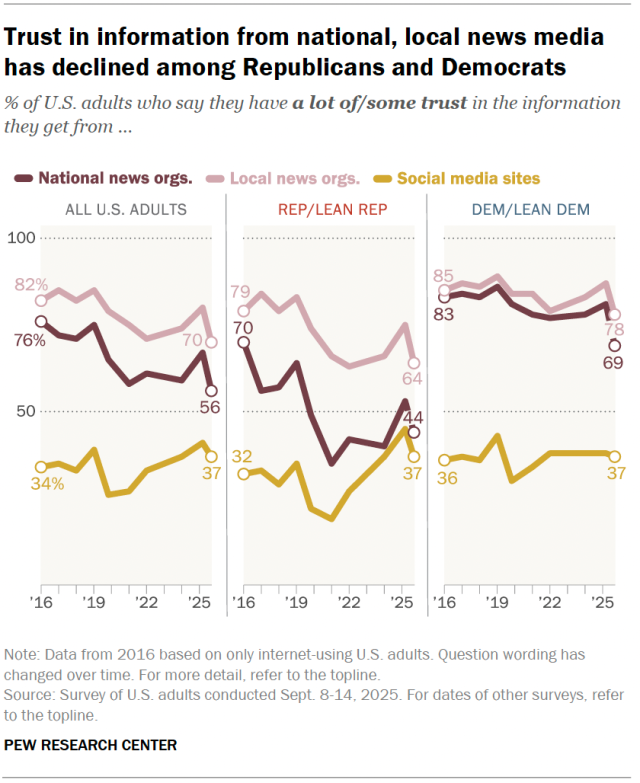Americans’ trust in information from national and local news organizations has declined after a slight increase earlier this year, according to a new Pew Research Center survey. The decline has occurred in both major political parties and across all age groups.

Overall, 56% of U.S. adults now say they have a lot of or some trust in the information they get from national news organizations – down 11 percentage points since March 2025 and 20 points since we first asked this question in 2016. The share of Americans who have at least some trust in information from local news organizations remains higher (70%), although it has also dropped – from 80% in March and 82% in 2016.
Fewer than half of Republicans and Republican-leaning independents (44%) now say they have at least some trust in the information that comes from national news organizations. This is down from 53% in March and 70% in 2016, but it’s still above its lowest point in 2021, when 35% of Republicans expressed this level of trust in the national media.
When it comes to local news organizations, Republicans are more trusting (64% have at least some trust), although the share who trust local media has also eroded from 75% in March and 79% in 2016.
As in the past, Democrats (including leaners) are more likely than Republicans to trust information from national and local news organizations. But Democrats’ trust in both types of organizations has also fallen in recent months. Today, 69% of Democrats have at least some trust in information from national news organizations. This is the lowest level recorded since we began asking the question, and down from 81% in March. Meanwhile, 78% have this level of trust in information from local news organizations, down from 87% earlier this year.
Republicans and Democrats are equally likely to say they have at least some trust in information from social media sites (37% in each group say this). Republicans are now less likely to trust this information than they were earlier this year (down 8 percentage points) after a period of steady increase. The share of Democrats who say they have at least some trust in information from social media sites has remained relatively consistent over the past several years.
Trust in national and local news media declines across all age groups
Americans under 50 are slightly less likely than those ages 50 and older to have trust in information from national and local media. Still, across all age groups, trust in these organizations has declined over the last several months.

Today, only around half of adults under 50 (52%) have a lot of or some trust in information from the national news media. Adults under 30, in particular, are now about as likely to say they trust information from national news organizations (51%) as they are to trust information from social media sites (50%). Older age groups, in turn, are more likely to trust national news organizations than social media.
Trust in local news organizations remains higher than trust in national news organizations among Americans of all ages.
Younger Democrats express less trust than older Democrats in national and local news
Trust in national and local news organizations also varies by party and age, especially among Democrats.

In the new survey, 79% of Democrats ages 65 and older say they have at least some trust in information from national news organizations. This falls to 73% among Democrats ages 50 to 64, 66% among those 30 to 49 and 61% among those under 30. The pattern is similar when it comes to trust in local news organizations: Older Democrats express more trust than younger Democrats.
Among Republicans, age differences are less pronounced. Half of Republicans 65 and older, for instance, say they trust information from the national news media. This figure falls to 42% among Republicans ages 18 to 29. And between 61% and 66% of Republicans in all age groups say they trust information from local news organizations.
Note: This is an update of an analysis originally published on Oct. 27, 2022. Here are the questions used, along with responses, and its methodology.

